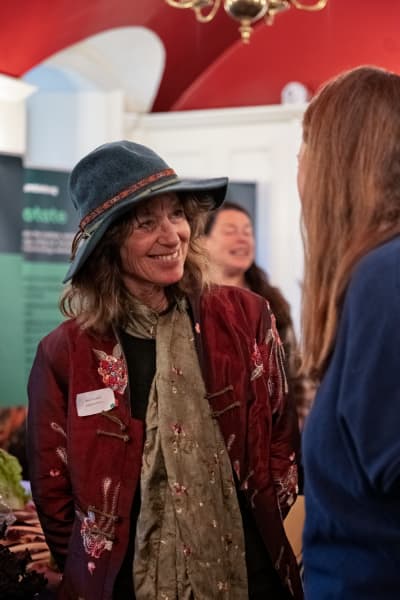 Food and drink is the UK’s largest manufacturing sector, but very little is produced here in Oxfordshire for local consumption. This workshop showcased the stories of some of the pioneers and asked what are the barriers and opportunities for local food manufacturing, and what needs to be done for the sector to grow.
Food and drink is the UK’s largest manufacturing sector, but very little is produced here in Oxfordshire for local consumption. This workshop showcased the stories of some of the pioneers and asked what are the barriers and opportunities for local food manufacturing, and what needs to be done for the sector to grow.
Although discussion raised a wide variety of challenges for the growth of Oxfordshire’s local food manufacturing sector, there was considerable alignment around the need for access to light industrial space, financing, access to markets and marketing capacity as key issues. There was also considerable energy in the room aimed towards tackling some of these issues, and a number of initiatives were suggested including a cooperative marketing body, the creation of shared processing space, and mechanisms to increase access to existing retail markets. Good Food Oxford has been taking forward some of these suggestions over the last year.
2. What happens to Oxfordshire’s agriculture if the UK leaves the EU?
 In the second Research Kitchen Claudia Havranek, from Oxford’s Department of Plant Sciences, spoke about the potential impacts of leaving the EU on food production and agriculture, drawing from her work on the Ditchley Park Estate in Oxfordshire.
In the second Research Kitchen Claudia Havranek, from Oxford’s Department of Plant Sciences, spoke about the potential impacts of leaving the EU on food production and agriculture, drawing from her work on the Ditchley Park Estate in Oxfordshire.
Being so close to the referendum, the event packed out and drew a lot of lively discussion.
You can read more on Brexit and agriculture in Claudia’s short article; ‘Leaving the EU: implications for the environment’, and Hannah Jacobs’ blog for GFO ‘Brexit and our food system’.
3. 1.5 degrees & LOTS of people: what does the future hold for Oxfordshire’s food system?
 The third Research Kitchen explored the challenge of feeding a growing population in the face of the storm of climate change. The Environmental Change Institute’s Dr Monika Zurek, shared her research on food systems and global environmental change processes and put Oxfordshire’s food system in the context of the Paris Agreement on 1.5 degrees C.
The third Research Kitchen explored the challenge of feeding a growing population in the face of the storm of climate change. The Environmental Change Institute’s Dr Monika Zurek, shared her research on food systems and global environmental change processes and put Oxfordshire’s food system in the context of the Paris Agreement on 1.5 degrees C.
1.5 degrees & LOTS of people presentation part 1
1.5 degrees & LOTS of people presentation part 2
4. How can researchers & Oxfordshire’s local food sector make the most of each other?
At the fourth Research Kitchen, the Environmental Change Institute’s Dr Bex White kicked off with an exploration of how researchers and practitioners in the food system can work together, including her experience of setting up the Brighton and Sussex Universities Food Network that brings together food researchers and practitioners. She looked at the pros and cons of different ways academia and practice can work together.
We then discussed how Oxfordshire might set up a beneficial and productive network of its own, a conversation which has now become reality through IFSTAL (Innovative Food Systems Teaching and Learning programme). IFSTAL is an Oxford University-based voluntary and interdisciplinary programme for graduate students, offering a complimentary source of theory and practice-based learning on food-related issues. A strong element of the IFSTAL programme is partnership with local food workplaces, the development of working skills and an internship and research placement programme.



